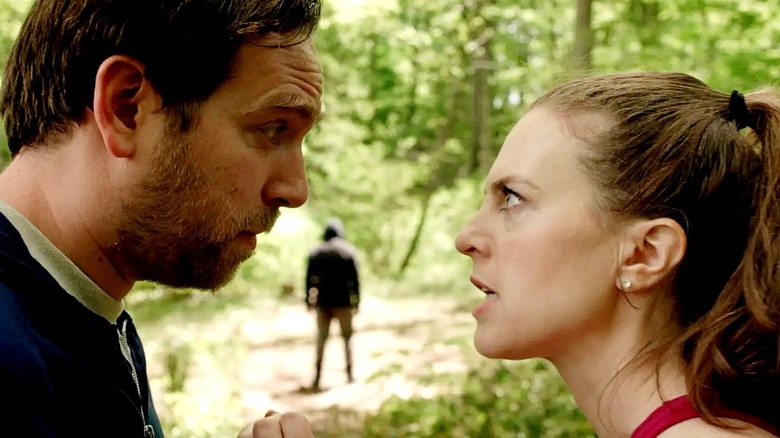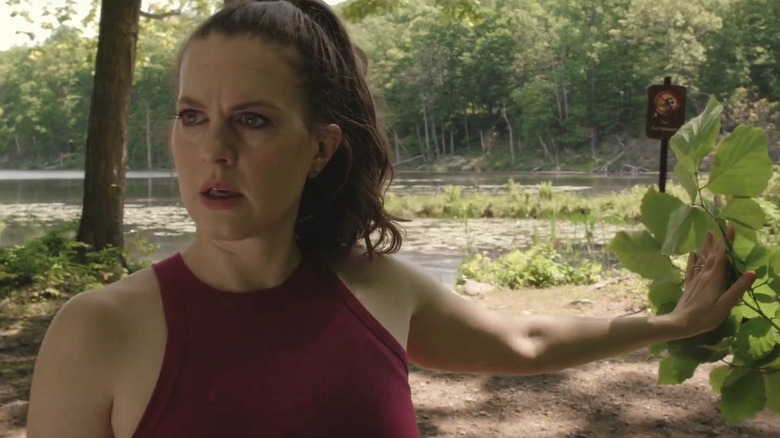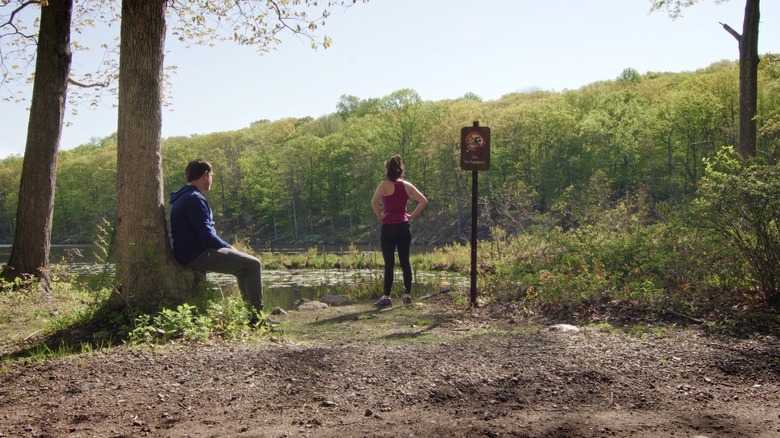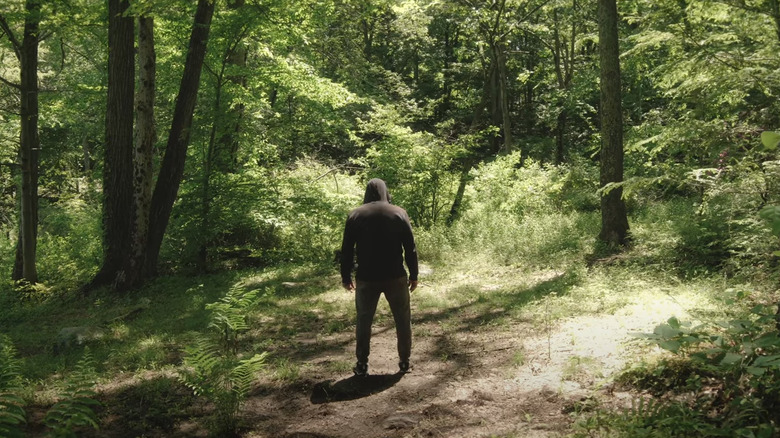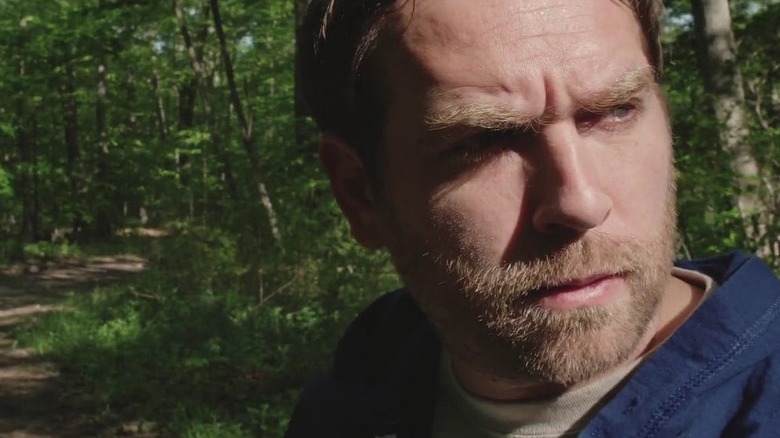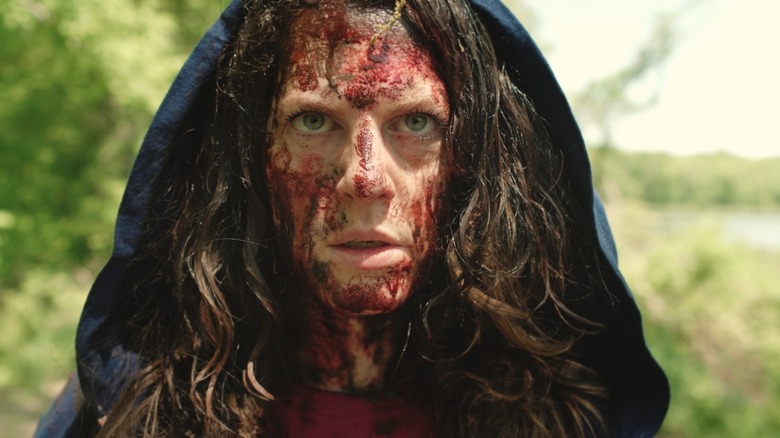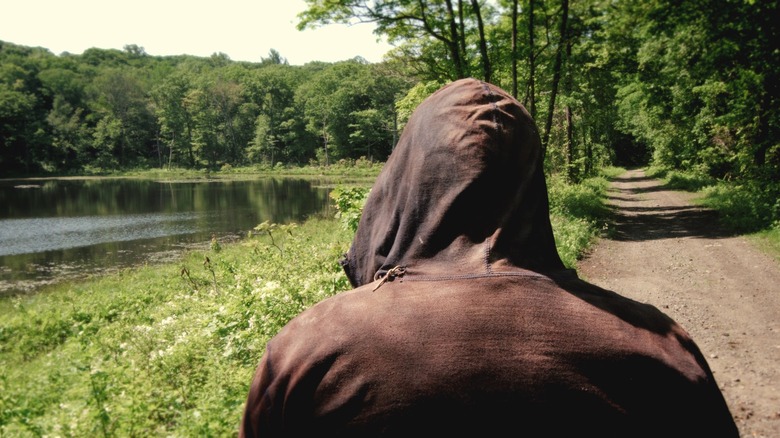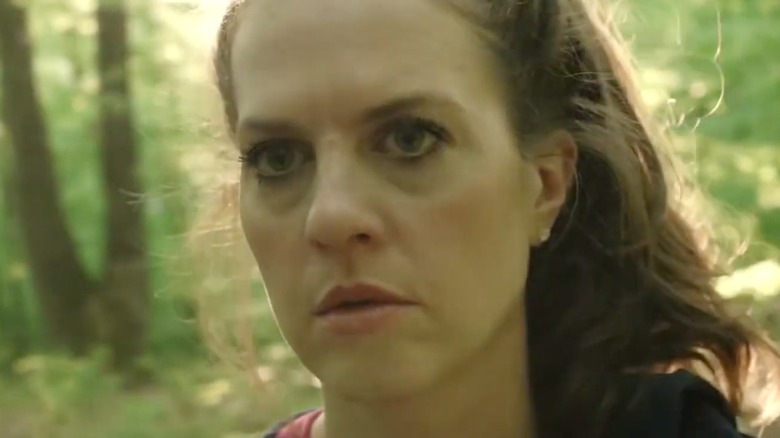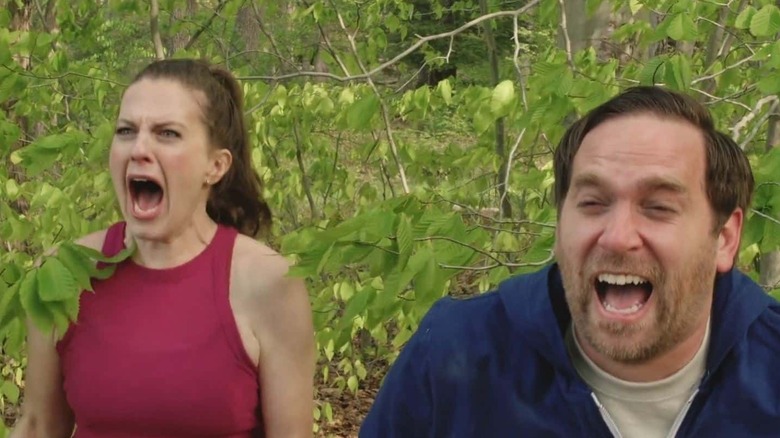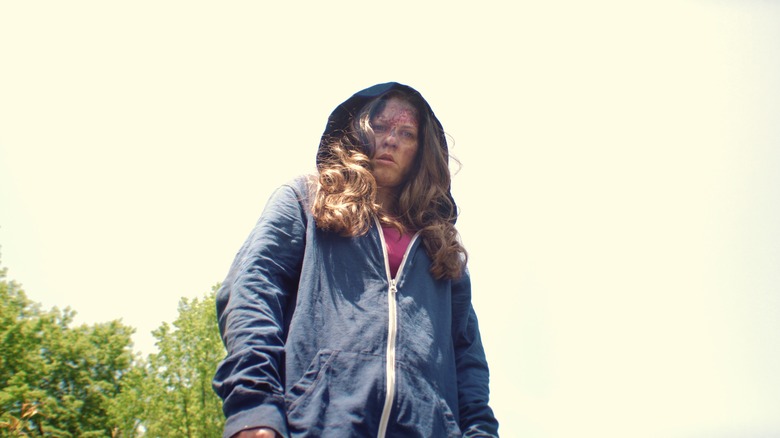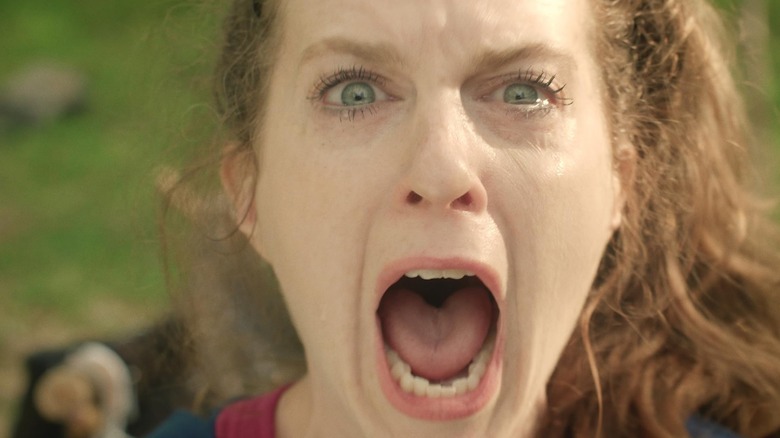The Ending Of Brightwood Explained
Contains spoilers for "Brightwood"
"Brightwood" is an indie surrealist horror film written and directed by newcomer Dane Elcar. It premiered in the U.S. at the Other Worlds Film Festival in 2022 and went on a long horror film festival run, but it's since become available for streaming via video on demand in the fall of 2023 and has been finding a growing audience. Though Elcar's sparse, tense story is ultimately its own thing, in more ways than one, it follows in several traditions that have come to define the horror genre.
"Brightwood" — like vintage hit "The Blair Witch Project" and more recent discovery "Skinamarink" — was made on an extremely low budget. It's all set in one location, with a cast of only two actors, each of whom wear the same costume throughout. Like some of the most effective horror movies as of late ("Midsommar," for example), it uses its premise to explore some of the more terrifying aspects of human relationships. And like "Midsommar," "Brightwood" is an experiment in daylight horror, in which all the scares and violence take place under the harsh glare of the sun. But this mind-bending and deeply upsetting romp's real calling card is how — like "Triangle" and "Timecrimes" before it — the film deploys temporal manipulation to make viewers feel much more panicked than they would by a mere gore-fest.
Because of these constraints and creative flourishes, and because Elcar shows more than he tells, audiences might escape the film's lake loop trail with lingering questions about what, exactly, they've just witnessed. This is what becomes of Dan (Max Woertendyke) and Jen (Dana Berger), not to mention their marriage, and what it all really means — this is the "Brightwood" ending, explained.
What you need to remember about the plot of Brightwood
"Brightwood" begins as Jen goes for a morning jog with her husband, Dan, lagging not too far behind. She wants to do four laps around the lake, and he's come along because it's the only quality time he gets to spend with her. The first audio the audience hears is the podcast Jen is listening to as she runs ... a podcast about separation and divorce. Their marriage is at a crossroads. Dan repeatedly reminds Jen that they've been together "a long time" and that their relationship could go in one of many "directions." Dane Elcar's word choice is no accident; Dan's phraseology foreshadows everything that's about to happen.
Soon enough, we learn that Dan drank two bottles of wine at a party to celebrate Jen's promotion and may have hit on her co-worker. She thinks he's a loser (she admits she thinks about stabbing him in the neck all the time) and takes off to run ahead of him. But upon completing her first loop of the lake trail, she realizes that the path that led from their neighborhood to the park is, bizarrely, gone. At first, she and Dan bicker as they try to solve the problem of the missing trailhead. Are they lost? Did the wind blow down some trees? Is someone messing with them, moving the "No Swimming" sign? Solutions don't present themselves, and to add extra confusion to their predicament, they keep seeing a mysterious hooded figure in the distance. About 20 minutes into this real-time(ish) thriller, their marriage seems to be in as much danger as they are.
What's really going on at the lake?
Dan and Jen experience small, strange phenomena as soon as they get to the lake. Someone crashes into Dan while running, but he doesn't catch a glimpse of who it is. Both he and Jen hear sounds that give them headaches. And then there's the looming presence of a figure in what appears to be a brown hooded sweatshirt. But Dan and Jen only begin to suspect that something might've gone wrong on a supernatural level when Jen drops her earbuds. On their next lap, two pairs of earbuds are on the ground.
Desperate for help, they work up the nerve to confront the person in the hoodie, who refuses to turn around even when Dan throws a pebble at them and Jen taps their shoulder. A second hooded figure sprints by, and the first one turns around and screams for them to run. Curiously, he looks an awful lot like Dan. Moments later, Jen is brutally murdered by yet another hooded figure who impales her with a sharpened stick.
It turns out the lake trail is a temporal and spatial loop. Though the rules aren't strictly defined, it seems like each time someone makes it all the way around (to use some Marvel Cinematic Universe terminology) another variant is generated. This explains why, until this point, Dan and Jen have run into versions of themselves that seem a little off. It's because they're multiples who haven't participated in the same conversations or shared the same experiences. It also explains why there are ever more earbuds on the ground each time they return to the sign.
What happens at the end of Brightwood
After his Jen is killed, Dan encounters another Jen whose shoulders are sunburned. He promises he won't leave her just before another Dan puts that Dan out of his misery so that the sunburned Jen can have his sweatshirt. This Dan and Jen are more experienced at surviving in the lake loop, but they still have mixed feelings about murdering their variants, and they recoil in disgust at their bloodied, lifeless selves. At least, Jen does — until she has to finish off a Dan and clearly derives some satisfaction about actually getting to stab him in the neck.
The audience now follows this version of the couple as they come to terms with their situation, which Jen describes as being "stuck in hell" with Dan. They wonder about why they're stuck and how long they've been there, and they spy on other variants as they jog and argue on the trail. When they stumble upon a makeshift tent in which the corpse of a Dan variant has badly decomposed, they both accept that there is no escape and profess their love for each other. Unfortunately, this Dan is quickly dispatched by another hooded figure. Jen tries to flee from the attacker and falls into a pile of one of her own variants' remains, then hides in the lake (despite the "No Swimming" signs) until the threat has passed. A disoriented and scared Jen spots a silvery orb in the brush. As she gazes at her own reflection, she's killed by a Jen variant in a blue hoodie completely saturated with mud.
What does the ending mean?
At the very end of "Brightwood," the Jen variant in the mud-brown sweatshirt drags her kill — the Jen we had been following for the final third of the movie — back to her encampment. There, a Dan variant is feasting upon meat. It had been previously established during one of their conversations that Dan is not a hunter. But the last iterations of Dan and Jen realized they needed food. These final versions have figured out how to get it. As there doesn't appear to be any wildlife in the water or in the woods surrounding it, hunting the more frightened and vulnerable copies of themselves is their only option. The most experienced Dan and Jen have fully reconciled themselves to their fate and have turned to cannibalism to survive indefinitely in this purgatory.
Judging from their well-worn weapons and the nonchalant way they kill and consume their victims, it appears they've been at it for a while ... what Jen might call a stupid amount of time. In the end, while Dan and Jen have finally learned how to function together, their continued existence depends on their willingness to constantly kill themselves and each other.
What does the ending really mean?
That "Brightwood" is a metaphor for marriage is obvious, but it's such a multilayered one that it's still worth unpacking. When the film starts, Dan and Jen have problems that could plague any relationship. He's a borderline alcoholic with a porn addiction who doesn't take care of himself. She's a strong personality who's at her wit's end with his slacker behavior and, as a result, isn't very receptive to his romantic advances or apologies. But their lives are stable. Dane Elcar likely doesn't give us too much backstory about Dan and Jen so that we can see ourselves in them.
When the couple is faced with what they think is a minor obstacle, they immediately turn on each other, channeling years of bitterness and disappointment. Solving the problem is harder because of their lack of cooperation. Only when they begin to fear that they're in a much worse predicament than they'd originally thought do they start depending on each other and accepting each other's imperfections. The second Jen is happy enough to stick with the second Dan because at least she knows him and things could be worse. The final Dan and Jen realize they need each other on the most basic level.
"Brightwood" has something to say about perspective when it comes to deciding whether or not to stay with one's partner, but it's also a commentary on how complicated feelings can be in long-term relationships. Dan and Jen do love each other, but they hate each other too. Elcar is illustrating how, in essence, marriage is choosing to be stuck with someone who's sometimes your hero and sometimes your villain.
Why does the loop exist?
Just as Dan and Jen's lives are left vague, so is the mechanism that makes copies of the couple as time folds in on itself. The loop aspect isn't totally dissimilar from more well-known titles such as "Groundhog Day," "Edge of Tomorrow," or "Palm Springs." Time resets. The action begins again at the same place in time and space, even if the characters die, and the reality that they're stuck in seems to be inescapable. The difference with "Brightwood" is that it's not the same Dan and Jen merely waking up again. New Dans and Jens are created. This aspect of the film's surrealism has more in common with the MCU's branching timelines, except that all the copies of Dans and Jens are generated into this one reality (the lake), in which time and space behave differently. They exist in their own loops, but those loops can intersect with the loops of other Dans and Jens.
While the film doesn't offer an explanation, it at least provides an allusion that's also something of a meta joke. As if to make fun of Dan (who could credibly harbor crackpot theories), Jen puts forth the notion that alien time travel technology may have crash-landed in their exact location simply because of their bad luck. This is an egocentric view of the world, but it's in keeping with the world-building in "Brightwood," in which only Dans and Jens exist. Just before the end, Jen stumbles upon a metallic orb. The sound that's been giving them headaches throughout the movie is the loudest within its radius. Though it's not spelled out, the viewer could come to the conclusion that Jen was right.
What has the cast and crew said about Brightwood?
Dane Elcar told Cinema Crazed about the thought process and production process that went into making "Brightwood." With an estimated budget of just $14,000, the writer-director, his actors, and his sound designer and composer had to be resourceful and efficient. The film took 12 nonconsecutive days to shoot on location at Egbert Lake in Rockaway, New Jersey. Since the public still had access to the area, Elcar had to work around distractions such as people fishing and kids riding ATVs near his set. He edited the film himself over the following year, eventually adding in what he could fit of his friend Jason Cook's 83-minute original score.
"Horror from the seemingly mundane is my bag of chips," Elcar said. To him, relationships are "truly terrifying" subject matter. Of the warped plot, he said, "It allowed me to really explore the emotional cycles that can happen — the kind of progression and then regression in and out of toxicity."
Max Woertendyke, who plays Dan and co-produced the film, suggested Dana Berger for the role of Jen. They'd worked together before, had become good friends, and knew they'd have chemistry because of their pre-existing relationship. Berger explained to The Cinema Guys that playing Jen was "an actor's dream," while Woertendyke and Elcar added that they'd rehearsed so much over Zoom that they were able to be more creative, thanks to their high level of preparedness, once on set. One thing they couldn't prepare for? Ticks. Elcar said he contracted Lyme disease during the shoot.
What has the director said about the ending?
For those who paid close attention or for anyone who may have indulged in a rewatch of the film, the ending of "Brightwood" isn't that ambiguous. The variants of Dan and Jen who've been marooned at the lake the longest (but really, what does "longest" even mean in a time loop?) are shown to be the mysterious person (or in this case, people) in the brown hooded sweatshirt (that's really just the blue sweatshirt worn and caked with mud). They're getting along markedly better than the Dans and Jens they prey upon to sustain themselves. But Dane Elcar purposefully left more specific questions unanswered ... questions like why the loop exists in the first place, how it works, how many Dans and Jens are stuck in it, and how long they've all been there. He knows, but he's not telling.
In his interview with Cinema Crazed, Elcar said, "Sure, I have an idea of what is causing them to be trapped in this time paradox. And earlier versions of the script went a little more into the mechanics, however I never wanted to get that deep into it. For me it was way more important to focus on what this does to Dan and Jen's relationship than to fully explain why it's all actually happening." He did, however, leave hints in the film. He admitted that he loves hearing fan theories about "Brightwood" and is happy that audiences seem satisfied despite that he didn't "give it all away." And Elcar said he feels that he did provide definitive answers to what matters most about his movie. "I complete Dan and Jen's story by showing you their physical and emotional state," he asserted. "You must remember it's a love story above all else."
Will there be a sequel?
As of the time of writing, there's been no "Brightwood" sequel announcement, and given the nature of the film, it's unlikely writer-director Dane Elcar will pick up Dan and Jen's story again anytime soon. In part, that's because he already has revisited the concept with "Brightwood." Though this barebones indie horror flick is Elcar's first feature film, it's not his first time tackling the subject matter.
The troubling saga of Dan and Jen has its roots in a short film Elcar made and starred in back in 2017 called "The Pond." The roughly 16-minute live-action short has a lot in common with its full-length cinematic cousin. A man in a zip-up hoodie (we can't tell the color since "The Pond" is black and white) wearing earbuds goes for a walk on a trail that loops around a beautiful but eerie body of water. As it dawns on him that he can't find his way home and that he's permanently stuck on his path, he gets increasingly agitated to the point of losing his composure. Just as in "Brightwood," the man in the clean sweatshirt confronts a man in a filthy, worn sweatshirt who's revealed to be a variant of himself.
"Brightwood" ups the ante, in terms of both stakes and theme, by placing an unhappily married couple in the same situation. Elcar said he'd always intended his idea to become a feature about a couple, but he used "The Pond" to work out plot and location details.
What has been the critical and award response to Brightwood?
"Brightwood" has clearly been a hit with critics and on the festival circuit, with the ending in particular proving to be a satisfying payoff for viewers. The film sits at a "fresh" 94% on Rotten Tomatoes with 35 professional reviews in, and while the Popcornmeter audience score tracker lags behind with just 54%, there are fewer than 50 ratings in the mix. The Guardian called the movie "intelligent, scrappy filmmaking," while Flickering Myth summed it up as "a welcome slice of dark entertainment."
Meanwhile, the film has earned some prizes at various genre festivals, winning best science fiction feature at the 2022 Another Hole in the Head Genre Film Festival and best editing at the 2023 Horrorhound Film Festival, where it was also nominated for best feature, director, actor, supporting actor, sound design, and two more. Like many low-budget indies, "Brightwood" is a film that has created its buzz slowly as a movie that audiences need to discover on their own.
